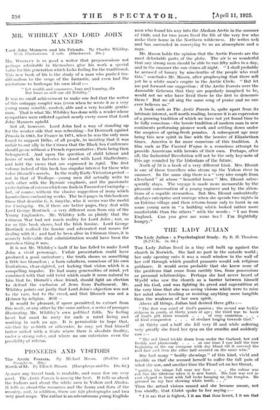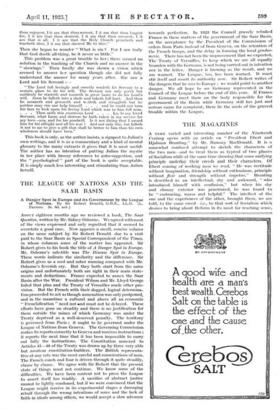THE LADY JULIAN
The Lady Julian : a Psychological Study. By R. H. Thouless. (S.P.C.K. 4s. 6d.)
THE Lady Julian lived in a tiny cell built up against the church in Norwich. She had no part in the outside world ; her only opening onto it was a small window in the wall of her cell through which puzzled peasants would ask religious
guidance. It would seem probable that she knew none of the problems that come from earthly ties, from possessions or personal relationships. Perhaps she had never heard of Wyclif who saw the church as a barrier between himself and his God, and was fighting its greed and superstition at the very time that she was seeing visions which were to raise her mind above heeding or resisting anything more tangible than the weakness of her own spirit.
Above all things, Julian had desired three gifts :-
" The first was mind of God's passion ; the second was bodily sickness in youth, at thirty years of age ; the third was to have of God's gift three wounds . . . of very contrition . . . of kind compassion . . . of stedfast longing towards God."
At thirty and a half she fell very ill and while suffering . very greatly she fixed her eyes on the crucifix and suddenly saw :--
" The red blood trickle down from under the Garland, hot and freshly and plenteously . . . at one time I saw half the face beginning at the ear overgone with dry blood till it covered the mid face and then the other half covered on the same wise."
She had may " bodily shewings " of this kind, vivid and terrible so that she seemed herself to suffer the full pain of what she saw, and another time the Fiend set on her throat,
" putting his visage full near my face . . . the colour was red like the tilestoue when it is new burnt. His hair was red as Just clipped in front with full locks hanging on the temples. He grinned on my face showing white teeth. . . ."
Then the actual visions ceased and she became aware, not less vividly, that Christ spoke to her saying :- " I it am that is highest, I it am that thou lovest, I it am that
thou enjoyest, I it am that thou servest, I it am that thou longest for, I it am that thou desirest, I it am that thou meanest, 1 it am that is all. I it am that the Holy church preacheth and teacheth thee, I it am that showed Me to thee."
Then she began to wonder " What is sin ? For I saw truly that God doeth all-thing, be it never so little."
This problem was a great trouble to her ; there seemed no solution in the teaching of the Church and no answer in the " shewings." Then finally she was shown a vision which seemed to answer her question though she did not fully understand the answer for many years after. She saw a Lord and his Servant :-
" The Lord full lovingly and sweetly sendeth his Servant to a certain place to do his will. The Servant not only goeth but suddenly he starteth and runneth in great haste to do his Lord's will. Anon he falleth into a slade and taketh full hurt. And then he moaneth and groaneth and w nleth and struggleth but he neither may rise nor help himself . . . and he could not turn his face to look upon his loving Lord which was to him full near. . . . Then said' this courteous Lord . . . Lo, lo my loved Servant, what harm and distress he bath taken in my service for my love—yea, and for his goodwill. Is it not fitting that I award him for his affright and all his woe ? And not only this, but falleth it not to me to give a gift that shall be better to him than his own wholeness should have been."
This book is only, as the author insists, a signpost to Julian's own writings, and it is as a commentary and a kind of mental glossary to the many extracts it gives that it is most useful. The author has no intention of putting Julian the mystic in her place with breezy references to auto-suggestion, and the " psychological " part of the book is quite acceptable. It is simply much less interesting and stimulating than Julian herself.











































 Previous page
Previous page